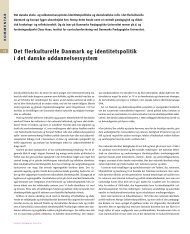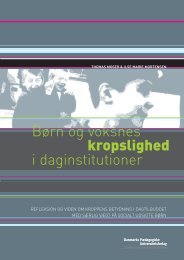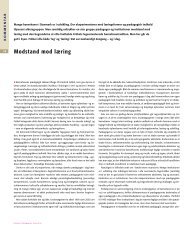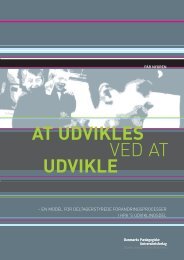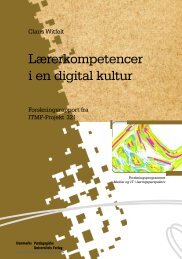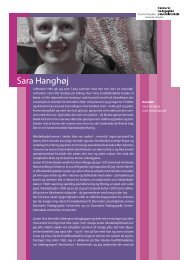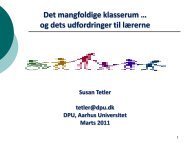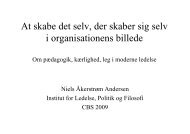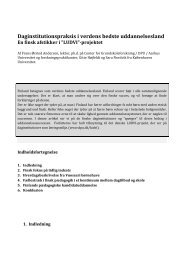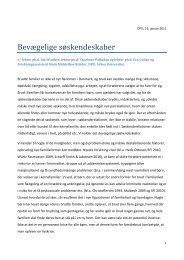SRI-Teknisk rapport-sen.v13 - DPU
SRI-Teknisk rapport-sen.v13 - DPU
SRI-Teknisk rapport-sen.v13 - DPU
You also want an ePaper? Increase the reach of your titles
YUMPU automatically turns print PDFs into web optimized ePapers that Google loves.
F.3 What do the author(s) conclude about the<br />
findings of the study?<br />
106<br />
2000). Given the question<br />
“How often did you work on tasks like those on the<br />
MSPAP?” students may have<br />
been focusing on the recent MSPAP test preparation<br />
activities. Thus, perhaps<br />
lower performing schools use more MSPAP-like<br />
formatted tasks in test preparation<br />
activities than those used by higher performing<br />
schools. Another possible explanation<br />
is that given the question “How often did you work<br />
on tasks like those<br />
on the MSPAP?” students may have been focusing on<br />
the format of MSPAP tasks<br />
and not on the learning outcomes reflected in the<br />
tasks. If so, lower performing<br />
schools may have been more likely to use more<br />
MSPAP-like formatted tasks than<br />
those used by higher performing schools. Schools<br />
performing at higher levels may<br />
be more successful at reflecting the science learning<br />
outcomes in a variety of<br />
reform-oriented problem formats. The finding of a<br />
similar negative effect for<br />
social studies substantiates the direction of the<br />
MSPAP-like Instruction effect.<br />
Finally, teacher perceptions of the degree of MSPAP<br />
Impact on classroom<br />
reading and writing activities was found to explain<br />
significantly the variability in<br />
1997 reading and writing performance. The direction<br />
of the effect indicates that<br />
an increased perceived impact of the MSPAP was<br />
associated with increased levels<br />
in 1997 MSPAP reading and writing performance.<br />
Details<br />
Teacher reports for some instruction-related predictors<br />
(Current Instruction or<br />
Reform-Oriented Tasks) were found to explain<br />
differences in MSPAP performance<br />
levels in all subject areas except social studies. In<br />
addition, the Reform-<br />
Oriented Tasks dimension was found to explain<br />
differences in rates of change in<br />
MSPAP performance with time for reading and<br />
writing. Finally, the perceived<br />
general impact of the MSPAP on instruction and<br />
assessment practices was found<br />
to explain either differences in MSPAP performance<br />
levels or rates of change with<br />
time across all subject areas except Social Studies.<br />
On the basis of the same set of<br />
questionnaires, other analyses have also suggested<br />
that classroom instruction and<br />
assessment practices have changed with time with



